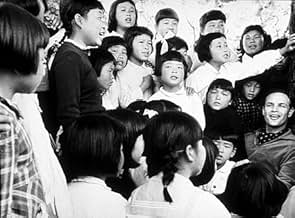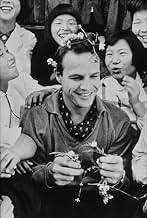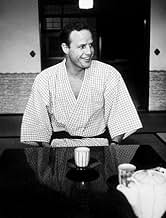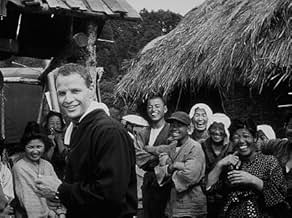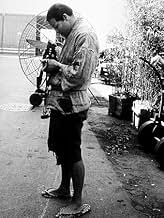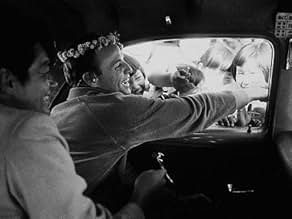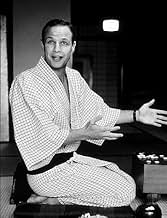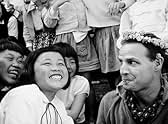VALUTAZIONE IMDb
6,6/10
3973
LA TUA VALUTAZIONE
Aggiungi una trama nella tua linguaIn post-WWII Japan, an American captain is brought in to help build a school, but the locals want a teahouse instead.In post-WWII Japan, an American captain is brought in to help build a school, but the locals want a teahouse instead.In post-WWII Japan, an American captain is brought in to help build a school, but the locals want a teahouse instead.
- Premi
- 1 vittoria e 9 candidature totali
Machiko Kyô
- Lotus Blossom
- (as Machiko Kyo)
Harry Morgan
- Sgt. Gregovich
- (as Henry {Harry} Morgan)
Carlo Fiore
- Soldier
- (non citato nei titoli originali)
John Grayson
- Soldier
- (non citato nei titoli originali)
Harry Harvey Jr.
- Soldier
- (non citato nei titoli originali)
Miyoshi Jingu
- Old Woman on Jeep
- (non citato nei titoli originali)
Roger McGee
- Soldier
- (non citato nei titoli originali)
Dansho Miyazaki
- Sumata's Father
- (non citato nei titoli originali)
Minoru Nishida
- Mr. Sumata
- (non citato nei titoli originali)
Aya Oyama
- Daughter on Jeep
- (non citato nei titoli originali)
Recensioni in evidenza
I have spent many years on Okinawa and am always amazed at Brando's ability to create a character (Sakini) that is true to the Okinawan character. I have watched it many times over and enjoy it every time. When I'm asked why I visit Okinawa so often, I usually loan them my copy of "Teahouse" and wait for a response. It is a story of a resilient and happy people who have retained their culture, through many invasions. Brando's monologue at the beginning and end of the film masterfully explains it all. The kids will like it and adults should get a laugh while watching the arrogant victors being steered to the Okinawan's needs in a hilarious manner. It's not quite history and it's not quite fantasy, but it's all good fun.
Marlon Brando stars as a Japanese interpreter and Glenn Ford plays a captain who has been in almost every branch in the military. Ford is ordered to go to a Japanese village to teach the people about democracy and to build a schoolhouse in the shape of the pentagon. The Japanese are only interested in building a teahouse and their isn't enough money to build both. The Japanese try to sell some homemade stuff but it won't sell until Ford finds out that they also make brandy. The military can't get enough brandy, so they build a teahouse instead of a schoolhouse. The military don't like what Ford is doing so they send a psychiatrist but he ends up helping them out instead. I thought Glenn Ford was great here and Brando also did a good job.
This movie was the first chance to see Marlon Brando in a truly comical role, not the "He Man"-unbelievably good! His accent, his body movements, the Japanese he spoke, hard to believe this was the same man who did the Waterfront.I really think he deserved an award for this role. These were a couple of the most enjoyable hours I've ever spent. Having lived in Okinawa, and familiar with the practical, down-to-earth people there, I enjoyed the movie that makes so much fun and caricatures narrow-mindedness and pompousness while exalting creativity, adaptation, and "what really matters". The movie does make fun of the narrow-mindedness of some Americans, and shows the Okinawans with respect and tenderness, as assertive, business-minded, resilient, and proud. A real quality movie, and I'm so glad I taped it from Turner Classic movies.10 out of 10.
Marlon Brando was amazing in this film. I saw the comments made on TCM before they started the film and they said he saw the stage play and begged Paramount (?) to let him have a part in it when they made the film. They said he could have any part he wanted and he picked Sakini, the translator. As a Japanese teacher I want to tell you that I was stunned at his perfect accent! He spoke English exactly as a native Japanese person would. If I hadn't been told ahead of time that it was Marlon Brando, there is no way you could have convinced me that it wasn't a native Japanese actor doing the part. I could see that an attempt was made to make the natives look uneducated and doltish, but having lived in Japan for a year and a half, I simply couldn't see them that way. All you have to do is take a few minutes to watch any people and see the intelligence in their eyes and in their mannerisms and you can see how intelligent they really are whether YOU understand their language or not!
If you're not a fan of Glenn Ford's westerns, and you think he's merely an ordinary everyman, check out his timed perfection in The Teahouse of the August Moon. With such great talent, it's a wonder Jack Lemmon rose to stardom so quickly. Glenn has all the hesitation, stammering, exasperation, and desire to fix that it takes to be a comic genius. If the first time around, you don't catch all his jokes, don't worry. You were just laughing so hard, you couldn't keep up with the fast pace.
Every time I watch this delightful gem, I laugh myself sick. It does have a long running time, but it certainly goes by quickly. Glenn Ford's character is stationed in Okinawa after WWII, to oversee reconstruction and the wellbeing of the Japanese people. But in his mission to spread democracy, he's completely clueless in his new environment. Marlon Brando plays the scene-stealing Sakini, a Japanese interpreter who winks at and nudges the audience when he wants to make an inside joke. But even with an interpreter, Glenn still finds himself getting into one misunderstanding after another.
While it's seen as "white washing" by today's standards, Marlon Brando didn't intend for his performance to be offensive. In fact, he lived in a nearby Japanese village for four months to absorb the mannerisms, accent, and mentality of the local people. I found his portrayal of the savvy interpreter to be flawless; not only that, but I couldn't find any trace of his usual expressions or gestures. He completely transformed himself.
The story is heartwarming, funny, smart, and bittersweet. From Eddie Albert's obsession with soil and worms to Machiko Kyo's touching tea ceremony, this 1956 comedy is a one-of-a-kind gem with countless delightful moments.
Every time I watch this delightful gem, I laugh myself sick. It does have a long running time, but it certainly goes by quickly. Glenn Ford's character is stationed in Okinawa after WWII, to oversee reconstruction and the wellbeing of the Japanese people. But in his mission to spread democracy, he's completely clueless in his new environment. Marlon Brando plays the scene-stealing Sakini, a Japanese interpreter who winks at and nudges the audience when he wants to make an inside joke. But even with an interpreter, Glenn still finds himself getting into one misunderstanding after another.
While it's seen as "white washing" by today's standards, Marlon Brando didn't intend for his performance to be offensive. In fact, he lived in a nearby Japanese village for four months to absorb the mannerisms, accent, and mentality of the local people. I found his portrayal of the savvy interpreter to be flawless; not only that, but I couldn't find any trace of his usual expressions or gestures. He completely transformed himself.
The story is heartwarming, funny, smart, and bittersweet. From Eddie Albert's obsession with soil and worms to Machiko Kyo's touching tea ceremony, this 1956 comedy is a one-of-a-kind gem with countless delightful moments.
Lo sapevi?
- QuizProduction began with Louis Calhern playing Col. Purdy, but Calhern died after more than a month of filming. Paul Ford was quickly recruited, as he had created the role on Broadway, and this resulted a revived career for the lovable, irascible character actor.
- BlooperWhile Fisby and Sakini are finishing up their first address to the villagers Sakini asks Fisby what time it is. He responds that it's a quarter to 5:00. But the sun is directly over their heads as if it were noon.
- ConnessioniFeatured in Okinawa: Keystone of the Pacific (1973)
- Colonne sonoreSakura Sakura (Cherry Blossoms)
(uncredited)
Written and Arranged by Kikuko Kanai
Sung by Lotus Blossom
I più visti
Accedi per valutare e creare un elenco di titoli salvati per ottenere consigli personalizzati
Dettagli
- Data di uscita
- Paese di origine
- Lingue
- Celebre anche come
- The Teahouse of the August Moon
- Luoghi delle riprese
- Azienda produttrice
- Vedi altri crediti dell’azienda su IMDbPro
Botteghino
- Budget
- 3.926.000 USD (previsto)
- Tempo di esecuzione
- 2h 3min(123 min)
- Mix di suoni
Contribuisci a questa pagina
Suggerisci una modifica o aggiungi i contenuti mancanti


